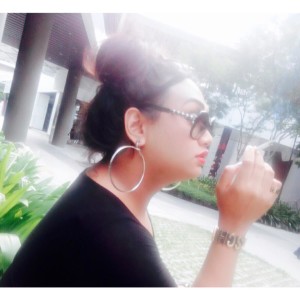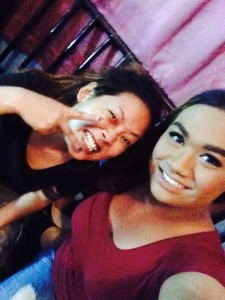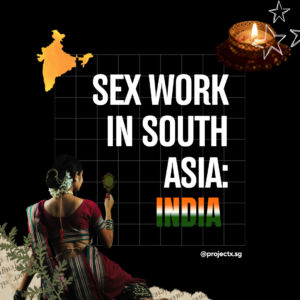(part two available here)
Transgender People and Singapore
People see transgender women as sex objects.
~Vanessa, on the perception of the transgender population in Singapore
Unfortunately, due to the salience of transgender people in contexts related to sex work and nightlife, Vanessa’s words above tend to accurately reflect reality. She explains, “When people hear ‘transwomen’, ‘sex worker’ immediately comes to their mind…But in fact, there are a number of transgender women who are not sex workers. And there are tons of them that have moved into mainstream society and are in some ways, undetectable…So who becomes the most visible? People on the streets”
With the transgender culture in Singapore being largely limited to places such as Boom Boom Room, Desker Road, Orchard Towers, and Goldust, all of which are associated with the realms of the sex trade and night light, it is no wonder why such stereotypes tend to take the forefront. Vanessa adds, “people tend to see them as two-dimensional creatures with no heart and no mind…that they are objects with no humanity.” But such stereotypes are far from the truth. As Julie puts it, “We are not clowns. We are not aliens. We are human too, we have feelings. We are all the same. We feel happy, we cry, we feel sad, we feel angry…we are just trapped in the wrong body”
Furthermore, because of their difference in who they are and what they do, Vanessa feels that transgender women (and sex workers in general) tend to be viewed as criminals “who destroy property, who harm life, who harm things”. And, it is such stigmatization that indirectly led to the red-light district, not only in Singapore, to have the seedy reputation that it currently has. She explains, “seeing them as criminals adds not only to stigma, but it blocks access to justice. They don’t dare to go to the police! Customer beat me up, ok la I beat the customer up. Because I know I cannot go to the police, so where am I going to seek justice? My own fist la. Which is why people have this conception that the sex industry is so dangerous. It’s because there is no other avenue to seek any kind of mediation.” She continues, “Sex work is two mutually consenting adults, doing things on their own whatever. Why is it considered a crime?”
Due to their inability to fit into the conventional male-female dichotomy, people like Julie feel that who they are as human beings tend to get lost in the debate about their biological characteristics. Julie describes herself as “loud, friendly, and easily curious”, but agrees that this side of her tends to get pushed into the background because people struggle to see her as either a man or a woman.
With the transgender community and the sex work industry being relatively unknown and ignored by mainstream society, Julie and Vanessa both agree that more can be done to help sex workers working the streets in Singapore (be they transgender or cisgender), not only in actual intervention but in awareness as well. Julie explains, “at that point of time, I didn’t know about any center. All I know was this Project X and T Project…I didn’t know anything about any program at that point in time. Only when I met Project X, then I knew that there was this T Project. So at that point of time, I only knew about these two places that could help people in need.”
However, it is precisely because of this stigma and forgotten status of these communities and industry that organizations such as Project X have taken root in the country. Vanessa shares about one of the goals of the organization, “We want them to know that are not alone in this. Even if you might feel like you are alone in this, it’s important to just show people that there are people who understand why you are doing this, there are people who won’t judge you for what you’re doing and people who are willing to assist you in whatever difficulties you might have without judgments.”
2016
Today, Julie works at an F&B establishment in Singapore and has cut all of her ties with her past life. Despite initially facing the anger, sadness, and disappointment of her family members, Julie stayed true to herself. Fortunately, Julie now feels that they understand her better. Having never been close to her natural family, Julie currently lives with her aunt, who welcomed her back home and has accepted her for who she is despite the initial outrage.
A far cry from the lady who struggled with acceptance, money, and vices; Julie now hopes to be able to save up enough money to move out on her own and give her aunt’s family the privacy she feels they deserve. Additionally, she hopes to one day be able to return to school and ultimately, be able to pursue her dreams of becoming a fashion designer. “I don’t care about how people feel. I don’t care about how people think of me. I know that I’m happy”, shares Julie, regarding her new outlook on life, “I don’t care if they think I’m weird if they make fun of me. I always always always make myself happy first. Then my family, then my friends”

However, her days in the red-light district still remain as a chip on her shoulder. She says, “If I could turn back time, I would be a proper one (woman)…I would work a normal job, like what a proper woman would do.”
From her point of view, Julie feels that her life would have been different if she had met people who, like Vanessa, were understanding and accepting of who she is. She shares, “when I first started becoming who I am, I didn’t meet friendly people. I met bad people, like bullies and everything. The only nice people I met were at the red-light district. They took care of me. But maybe if I had met people like Vanessa first, I didn’t have to become a sex worker. She could have found me a normal job.”
“If you want to be a real woman, be a proper one. It doesn’t mean that because you are a transsexual, you got to go through the red-light district. That’s wrong, you can always go to school. You can just go to work. You don’t have to go through the red-light district, you don’t have to take drugs to be a woman. You can always be a proper one,” these are words of wisdom that Julie wishes that she could have told her younger self. However, these are definitely words that any young transgender person starting to accept their identity can benefit from as well.
While Singapore and the world, in general, has come a long way towards the acceptance of LGBT individuals and the sex industry, it would probably be a long time before they would be treated as equal, contributing members of society. In the long run, Project X hopes to one day see a society that is fair and safe for sex workers. As Vanessa puts it, “ one that respects sex workers. And not just sex workers, but their clients, their partners, and their families and friends.”
Final words
Julie’s story bears testament towards the strength of human beings to be able to stand strong and survive in the face of adversity. While the road ahead is still long and would be filled with multiple obstacles for this young lady, the resilience and resourcefulness that she has shown thus far would definitely allow her to persevere and thrive regardless of the circumstances. And, with individuals such as Vanessa and organizations such as REACH and Project X around, she can be sure that it would not be a journey that she would have to take alone.

Guest article by Jarren Lye. Jarren is currently in his third year at the National University of Singapore, majoring in Linguistics and Social Work. He is interested in social issues in Singapore, particularly those revolving around the LGBTQ+ community. He hopes to be able to utilise his writing skills as a platform raise awareness about the community and allow the voices of the marginalised to be heard. Jarren can be contacted at [email protected]
To find out more about the organizations mentioned in the articles, please visit their websites or contact them in the ways mentioned below:
Project X
Website: theprojectx.org (An online Abuser Alert Programme form can be found here as well)
Email: [email protected]
Phone: 9242 6016 (Call and Whatsapp)
The T Project
Website: https://www.facebook.com/TheTprojectsg/info
Reach Youth
Website: www.reach.org.sg
Email: [email protected]
Phone: 6801 0740





